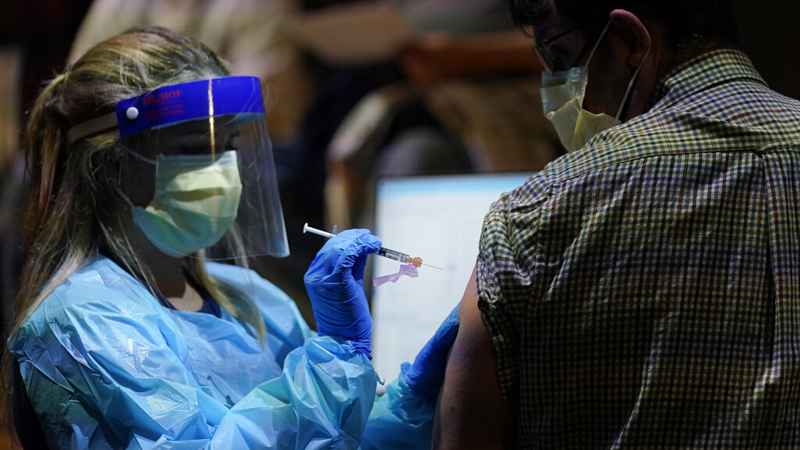Expanded vaccine rollout in US spawns a new set of problems

A man receives a COVID-19 vaccine at Englewood Health in Englewood, N.J., Thursday, Jan. 14, 2021. The rapid expansion of vaccinations to senior citizens across the U.S. has led to bottlenecks, system crashes and hard feelings in many states because of overwhelming demand for the shots.[AP/ Seth Wenig]
The rapid expansion of COVID-19 vaccinations to senior citizens across the U.S. has led to bottlenecks, system crashes and hard feelings in many states because of overwhelming demand for the shots.
Mississippi’s Health Department stopped taking new appointments the same day it began accepting them because of a "monumental surge" in requests. People had to wait hours to book vaccinations through a state website or a toll-free number Tuesday and Wednesday, and many were booted off the site because of technical problems and had to start over.
In California, counties begged for more coronavirus vaccine to reach millions of its senior citizens. In South Carolina, hospitals ran out appointment slots within hours.
Up until the past few days, health care workers and nursing home patients had largely been given priority in most places around the U.S. But amid frustration over the slow rollout, states have thrown open the line to many of the nation’s senior citizens with the blessing of the Trump administration, though the minimum age varies from place to place, at 65, 70 or higher.
The U.S., meanwhile, recorded 3,848 deaths on Wednesday, down from an all-time high of 4,327 the day before, according to Johns Hopkins University. The nation’s overall death toll from COVID-19 has topped 385,000.
More than 11.1 million Americans, or over 3% of the U.S. population, have gotten their first shot of the vaccine, a gain of about 800,000 from the day before, the Centers for Disease Control and Prevention said Thursday. The goal of inoculating anywhere between 70% and 85% of the population to achieve herd immunity and conquer the outbreak is still many months away.
KSTP’s complete COVID-19 coverage
California, which has seen a surge of deaths and hospitalizations since last fall, had received more than 2.4 million doses as of Monday, but only a third of them had been used.
Hard-hit Los Angeles County, the nation’s most populous county with 10 million residents, said it couldn’t immediately provide shots to the elderly because it had inoculated only about a quarter of its 800,000 health care workers.
"We’re not done with our health care workers, and we actually don’t have enough vaccine right now to be able to get done more quickly," Public Health Director Barbara Ferrer said. "We haven’t heard back from the state about vaccine availability and how it would be distributed."
Santa Clara County public health officials said the county of 2 million people had only enough vaccine to inoculate people 75 and older, not the 65-and-older crowd.
"It’s almost like a beauty contest. And this should not be a beauty contest," Santa Clara County Supervisor Cindy Chavez said. "This is about life and death."
In Mississippi, officials said new appointments will probably have to wait until a hoped-for shipment of vaccines in mid-February.
"Neither the county health department drive-through sites, nor the … vaccine scheduling website was designed to accommodate the monumental surge we are currently experiencing," the state Health Department said. State officials said they "understand the frustration brought on by this sudden change of plans."
In South Carolina, Kershaw Health in Camden implored people not to call its hospitals or doctors to schedule vaccine appointments after receiving more than 1,000 requests in two days.
Arizona, which had the nation’s highest COVID-19 diagnosis rate over the past week, will start signing up people 65 and older next week. It also plans to open a vaccination site at Phoenix Municipal Stadium in addition to the one dispensing thousands of shots daily at the home of the NFL’s Arizona Cardinals.
Meanwhile, some states, like Minnesota, are waiting before throwing open the doors.
"As we learn more, we will work to make sure everyone who is eligible for a vaccine knows how, where, and when they can get their shots," the state Health Department said in an email Wednesday. "Everyone’s opportunity to get vaccinated will come; it will just take some time."
California lawmakers are increasing the pressure on Gov. Gavin Newsom to expand authorization for who can administer doses to include nursing students, retired medical workers, firefighters and National Guard members with medical training.
Newsom said the state’s priority is to deliver vaccines "as quickly as possible to those who face the gravest consequences." He urged patience for those not yet eligible, saying: "Your turn is coming."